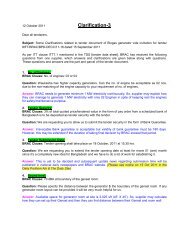Combining health and social protection measures to reach the ultra ...
Combining health and social protection measures to reach the ultra ...
Combining health and social protection measures to reach the ultra ...
- No tags were found...
You also want an ePaper? Increase the reach of your titles
YUMPU automatically turns print PDFs into web optimized ePapers that Google loves.
Access <strong>to</strong> <strong>health</strong>knowledge <strong>and</strong> education levels, <strong>and</strong> global preventionactivities. On <strong>the</strong> o<strong>the</strong>r h<strong>and</strong>, it also influences importantrisk fac<strong>to</strong>rs associated with violence such as incomeinequality, collective conflict, <strong>and</strong> trade in alcohol, drugsor firearms.LifestyleDue <strong>to</strong> <strong>the</strong> widespread flow of people, information <strong>and</strong> ideas,lifestyles also spread throughout <strong>the</strong> world. It is alreadywidely acknowledged that several modern behavioural fac<strong>to</strong>rssuch as an un<strong>health</strong>y diet, physical inactivity, smoking,alcohol misuse <strong>and</strong> <strong>the</strong> use of illicit drugs are having aprofound impact on human <strong>health</strong> 51-54 . Individuals respond <strong>to</strong><strong>the</strong> range of <strong>health</strong>y as well as un<strong>health</strong>y lifestyle options <strong>and</strong>choices available in a community 55 , which are in turndetermined by global trade, economic development <strong>and</strong><strong>social</strong> interactions. Although <strong>the</strong> major chronic diseases arenot transmittable via an infectious agent, <strong>the</strong> behaviours thatpredispose <strong>to</strong> <strong>the</strong>se diseases can be communicated byadvertising, product marketing <strong>and</strong> <strong>social</strong> interactions 56 .Global trade <strong>and</strong> marketing developments drive, for example,un<strong>health</strong>y developments in diet 53,55 , <strong>to</strong>bacco use 53,57 , <strong>and</strong>alcohol consumption 58 .However, <strong>health</strong> education can play a role in promoting<strong>health</strong>y lifestyles by improving an individual’s knowledgeabout <strong>the</strong> <strong>health</strong> effects of different lifestyle options. Besides<strong>health</strong> education, (global) policies can also directlydiscourage un<strong>health</strong>y behaviour by means of economicincentives (e.g. charging excise on <strong>to</strong>bacco) or o<strong>the</strong>rlegislation. An effective implementation of WHO FrameworkConvention on Tobacco Control (FCTC) 59 is expected <strong>to</strong> haveprofound implications on <strong>to</strong>bacco related-policies <strong>and</strong>,hopefully, <strong>to</strong>bacco use.Physical living environment: infectious disease pathogensThe spread of infectious diseases is probably one of <strong>the</strong> mostmentioned <strong>health</strong> effects of globalization <strong>and</strong> past diseaseoutbreaks have been linked <strong>to</strong> fac<strong>to</strong>rs that are related <strong>to</strong> <strong>the</strong>globalization process (e.g. Newcomb 60 ). The SARS outbreakdemonstrated <strong>the</strong> potential of new infectious diseases <strong>to</strong>spread rapidly in <strong>to</strong>day’s world. The combination ofmovement of goods <strong>and</strong> people, <strong>and</strong> profound changesaffecting ecosystem goods <strong>and</strong> services all contribute <strong>to</strong>increased risk of disease spread. For example, <strong>the</strong>globalization of food production, trade <strong>and</strong> consumption hasbeen associated with <strong>the</strong> increased spread <strong>and</strong> transmissionof food born diseases 61 .The global spread of knowledge <strong>and</strong> technologies,however, can improve <strong>the</strong> outbreak surveillance <strong>and</strong>moni<strong>to</strong>ring of antibiotic resistance 21 , increasing <strong>the</strong> speedof responses in some cases. Wilson 28 states thatresponding <strong>to</strong> disease emergence requires a globalperspective. Hence, <strong>the</strong> policies <strong>and</strong> actions undertakenby WHO are becoming increasingly important incontrolling infectious diseases at a global level. Forinstance, WHO played a critical role in controlling SARSby means of global alerts, geographically specific traveladvisories <strong>and</strong> moni<strong>to</strong>ring 62 .FoodFood trade has become an increasingly important fac<strong>to</strong>r withregard <strong>to</strong> food security worldwide. At present, however, <strong>the</strong>developed countries still subsidize <strong>the</strong>ir agricultural sec<strong>to</strong>rs,<strong>and</strong> tariffs for agricultural products remain relatively high.Economic liberalization policies are expected <strong>to</strong> haveprofound implications on food trade <strong>and</strong>, subsequently foodsecurity 63 . Some argue that free trade will create access <strong>to</strong>better <strong>and</strong> cheaper food supplies via food imports <strong>and</strong> canstimulate more efficient use of <strong>the</strong> world’s resources, as wellas <strong>the</strong> production of food in regions that are more suitable <strong>to</strong>do so. Accelerated economic growth can also contribute <strong>to</strong>food security 63, 64 . According <strong>to</strong> The State Of Food Insecurity in<strong>the</strong> World 2005 65 , accelerating <strong>the</strong> progress <strong>to</strong>wards an open<strong>and</strong> more equitable trading system is one of <strong>the</strong> key elementsin <strong>the</strong> worldwide reduction in hunger.On <strong>the</strong> o<strong>the</strong>r h<strong>and</strong>, trade could also endanger food security(e.g. Lang 66 ). For many countries <strong>the</strong> increasing dependenceincreases <strong>the</strong>ir vulnerability <strong>to</strong> shocks arising in globalmarkets, which can affect import capacity <strong>and</strong> access <strong>to</strong> foodimports 63 . Many food insecure countries are not able <strong>to</strong> earnenough with exporting goods in order <strong>to</strong> pay for <strong>the</strong> neededfood imports 67 .At <strong>the</strong> global level, <strong>the</strong>re are increasing international efforts<strong>to</strong> achieve widespread food security. In 1996, <strong>the</strong> World FoodSummit, for example, stressed <strong>the</strong> right of everyone <strong>to</strong> haveaccess <strong>to</strong> safe <strong>and</strong> nutritious food. Globalization can alsoenhance <strong>the</strong> knowledge of foreign nations about <strong>the</strong>usefulness of food aid. Additionally, <strong>the</strong> globalization processcan facilitate <strong>the</strong> worldwide implementation of bettertechnologies <strong>and</strong> improved knowledge. At <strong>the</strong> same time,however, <strong>the</strong> natural resource base for food production isincreasingly threatened by compromised ecosystemfunctioning due <strong>to</strong> global environmental change.WaterGlobalization also raises concerns over water security. Theglobalization process is accompanied by privatization policiesaffecting <strong>the</strong> provision of water. Governments <strong>and</strong>international financial institutions promote privatization, as<strong>the</strong>y believe it will promote market competition <strong>and</strong> efficiency.O<strong>the</strong>rs are less optimistic about <strong>the</strong> effects of privatization. Infact, some cases show that prices <strong>and</strong> inequalities in accesseven rise 68 . The virtual trade of water is also believed <strong>to</strong> be ofincreasing importance, The water that is used in <strong>the</strong>production process of a commodity is called <strong>the</strong> “virtualwater” contained in that commodity. Therefore, <strong>the</strong> increasingglobal trade of commodities is accompanied by an increasingtrade in virtual water 69 .In addition, <strong>the</strong> globalization process can increase watersecurity by facilitating <strong>the</strong> worldwide implementation of bettertechnologies <strong>and</strong> improved knowledge. At <strong>the</strong> same time, <strong>the</strong>natural resource base is increasingly threatened as, forexample, global climate change <strong>and</strong> deforestation profoundlyaffect our ecosystems’ ability <strong>to</strong> provide us with sufficient <strong>and</strong>adequate fresh water. On a global scale, <strong>the</strong>re are increasingefforts <strong>to</strong> set up global guidelines or policies with regard <strong>to</strong>fresh water, however, none of <strong>the</strong> international declarationsGlobal Forum Update on Research for Health Volume 4 ✜ 071



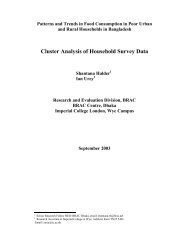
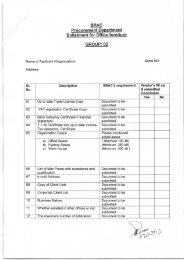
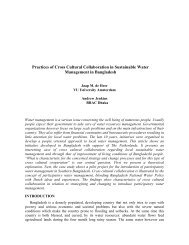
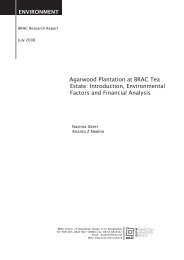
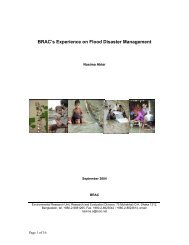
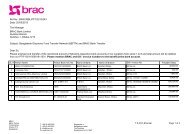
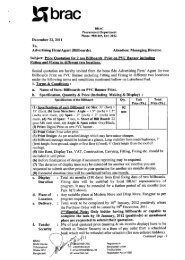
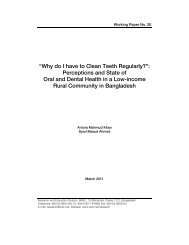
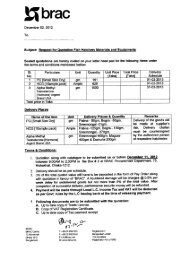

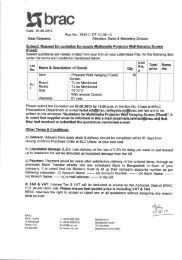
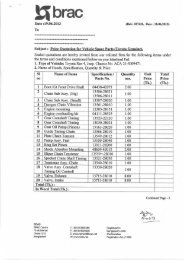
![[re-tender] RFQ for supply of Diesel Generator - Brac](https://img.yumpu.com/44421374/1/186x260/re-tender-rfq-for-supply-of-diesel-generator-brac.jpg?quality=85)
